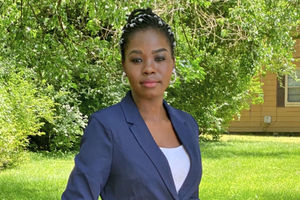
Home Country: Nigeria
Major: Political Science
Minors: Peace Studies and Art Studio
What drew you to study peace at the Kroc Institute?
Growing up in a small village in Northern Nigeria, I have witnessed gender-based inequality regarding education and I have experienced and survived violence at the hands of the terrorist group known as Boko Haram. When I came to Notre Dame, I developed an interest in studying the causes, effects, and potential solutions to these unjust situations that still day affect my family, my community, my friends, and my country.
Have any specific classes or professors had a big impact on how you see the world?
I took “Introduction to Peace Studies” with Professor [Ernesto] Verdeja. Professor Verdeja's introduction to peace studies intrigued me and I decided to minor in peace studies. After taking the introductory course, I wanted to find out more about peace resolution, peace transformation, and how to resolve conflict without involving violence.
Professor [Emmanuel] Katongole’s reconciliation course taught me about how approaching reconciliation from the perspective of peace studies and theology, rather than a single discipline, can lead more to conflict resolution and conflict transformation.
How does studying peace influence your political science studies and vice versa?
Certainly, one can study politics without peace studies, but I believe that peace studies and political science go hand-in-hand with one another. Political science helps us understand how government works on the domestic and international scale. Peace studies help us understand conflict transformation and conflict resolution; it looks at the future, at resolving conflicts, and finding solutions.
How (if at all) does being an international student affect your perspective when it comes to peace studies?
I grew up in a small community that has experienced significant violence at the hands of Boko Haram since 2009. I had almost forgotten how amazing it feels to live in a peaceful community. I had thought that my community was the only area in the world experiencing violence, injustice, poverty, lack of education, and gender-based violence. However, when I started minoring in peace studies, my narratives and beliefs changed. I realized that many countries have experienced terrorist threats, poverty, injustice, inequality, gender-based discrimination, and racism.
What would you say to someone considering majoring or minoring in peace studies?
I would strongly suggest a peace studies course to anyone who is majoring or minoring in theology, science, anthropology, political science, and other fields. This is because a minor in peace studies does not only help you develop organizational skills, problem-solving, communication, and conflict management, but it can also be used in fields related to preventing war.